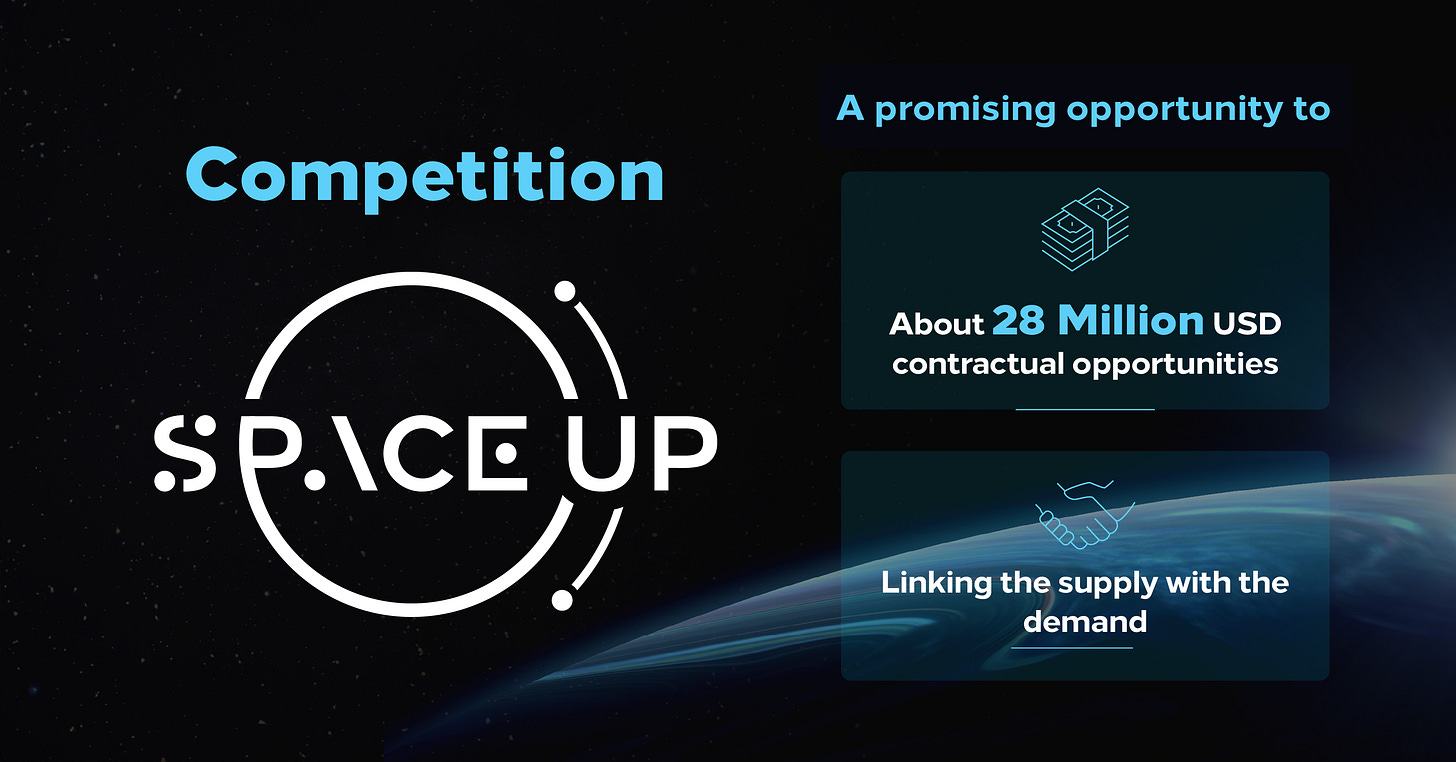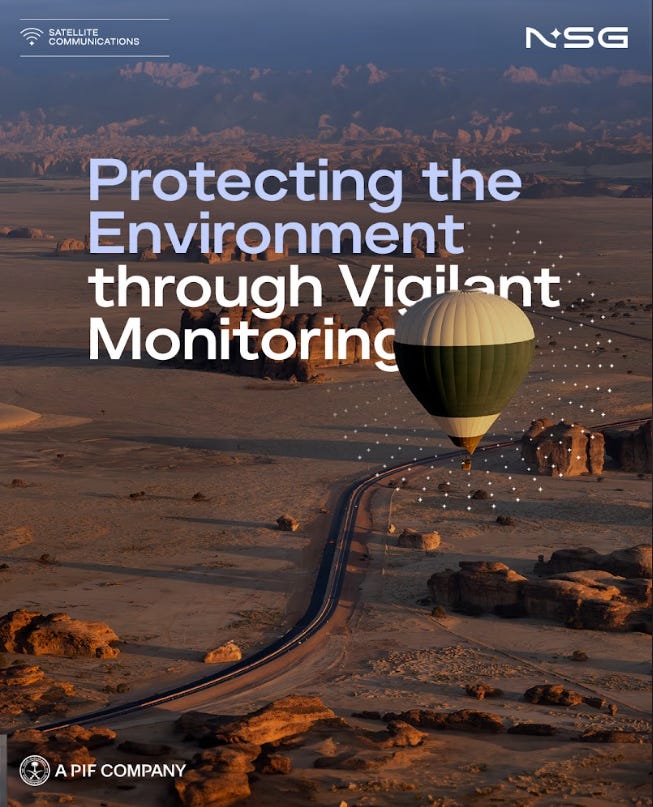Neo Space Group: Empowering Saudi Arabia’s Bold Leap into the Future
The Middle East Space Monitor by AzurX, in partnership with Neo Space Group
High above the Earth’s surface, a stunning transformation comes into view. The landscape of Saudi Arabia, famously characterized by expansive deserts, now displays a complex tapestry of evolution. Satellite imagery reveals the rise of verdant belts encircling growing cities, extensive infrastructure projects carving their way through the landscape, and innovative agricultural patterns taking root in once barren land. This view from space tells the story of a Kingdom deliberately reshaping itself.
This is not an image from a distant future. It is unfolding today as Saudi Arabia utilizes space-based Earth observation to propel its ambitious national transformation forward. Central to this quiet revolution is Neo Space Group (NSG), a company whose influence on Saudi Arabia’s future development might be as profound as the discovery of oil has been in its past.
The creation of NSG represents one of the most ambitious yet under-discussed elements of the Kingdom's economic transformation. As a subsidiary of the Public Investment Fund (PIF), NSG exemplifies Saudi Arabia's intent to diversify its economy and establish itself as a leading player in the global space economy.
A Strategic Architecture for Space
Encompassing satellite communications, Earth observation, geospatial services, positioning, navigation, and timing (PNT), alongside Internet of Things (IoT) technologies and venture capital investments, illustrates a well-rounded strategy rather than just casual entries into space commerce. NSG’s recent strategic developments emphasize this ambition, highlighted by the announcement in December 2024 of an agreement to acquire from Airbus Defence and Space the geospatial company UP42, a next-generation Earth observation digital platform headquartered in Berlin, Germany. This acquisition followed NSG winning the permit from the Communications, Space, and Technology Commission (CST), Saudi Arabia’s satellite technology regulator, to provide Earth observation platform services in the Kingdom.
What makes NSG especially compelling is how it directly ties to Vision 2030 objectives. The space sector offers precisely the kind of high-skilled job creation, knowledge economy development, and technological advancement that Saudi Arabia needs to reduce its economic dependence on fossil fuels. NSG CEO Martijn Blanken emphasized this connection, stating that the UP42 acquisition is "pivotal in fulfilling our vision to lead innovation in the geospatial sector both locally, and globally, and further contribute to the growth of the space economy in Saudi Arabia, in full alignment with Saudi Vision 2030."
From Desert to Orbit: Saudi Arabia's Space Journey
NSG and Saudi Arabia's ambitions in space did not materialize overnight. The Kingdom's space journey began in 1985 with the historic spaceflight of HRH Prince Sultan bin Salman Al Saud aboard the U.S. Space Shuttle Discovery, making him the first Arab, Muslim, and royal astronaut. This historic moment marked the beginning of Saudi aspirations beyond Earth's atmosphere, but the institutional foundation for space development would take decades to build.
The early 2000s saw the establishment of the King Abdulaziz City for Science and Technology (KACST) satellite program, which launched its first satellites—SaudiSat-1 and SaudiSat-2—in 2004. These modest satellites, the Kingdom's first indigenously-built space capabilities, were designed primarily for communications and basic remote sensing. While limited in scope compared to today's sophisticated systems, they served as critical educational projects for Saudi engineers and scientists.
In 2018, with the formation of the then Saudi Space Commission (SSC), the Kingdom's serious intent to become a space-faring power was unveiled. This was followed by the launch of SaudiSat-5A and -5B in 2018, which dramatically improved the country's Earth observation capabilities. The ascension of HRH Crown Prince Mohammed bin Salman brought with it Saudi Arabia’s Vision 2030, which explicitly highlighted space technology as a strategic sector for diversification and development.
In 2022, Saudi Arabia made further headlines with the announcement of its Astronaut Program, which sent Rayyanah Barnawi and Ali Al-Qarni to the International Space Station in 2023—making Barnawi the first Arab woman in space. This mission, beyond its scientific objectives, served as a powerful symbol of the Kingdom's modernization efforts and its commitment to including women in its technological future.
Neo Space Group: The Commercial Culmination
The creation of Neo Space Group in 2024, under the Public Investment Fund, represented the commercial culmination of these decades of gradual development. By bringing together disparate space efforts under one strategic entity and providing substantial investment, NSG is transforming Saudi Arabia from a space technology consumer to a potential provider with global ambitions.
For example, in 2024 NSG announced two key partnerships in its satellite communications vertical to provide Inflight Connectivity services to Thai Airways and Turkish Airlines. The strategic integration of UP42 into NSG's growing Geospatial division builds upon the earlier acquisition of Taqnia ETS in Q2 2024, which has been rebranded as NSG Geospatial Services. This acquisition significantly bolstered NSG's capabilities, bringing on board over 400 skilled employees and experience from more than 130 successful projects. The integration of Taqnia ETS' expertise in geospatial analysis, data management, and visualization has enhanced NSG's service offerings to both government and private sectors. As Blanken noted during the acquisition, "Welcoming Taqnia ETS into the NSG family is a key milestone in our journey to drive innovation in Earth observation services," adding that it "strengthens our ability to support Saudi Arabia's vision of becoming a leader in space technology while also driving regional growth and development."
The SpaceUp Competition: Homegrown Talent, Global Vision
The emphasis on local talent is particularly noteworthy, with Abdulaziz Al-Farraj, CEO of NSG Geospatial Services, highlighting that "Local talent is at the heart of our success. Our homegrown geospatial subject matter experts are uniquely positioned to deliver innovative solutions that meet both local and global needs, contributing to the realization of Vision 2030." This focus on developing domestic expertise aligns perfectly with Vision 2030's goals of creating high-skilled jobs for Saudi citizens.
NSG's role is further amplified by its strategic partnership in the SpaceUp Competition, a global initiative organized by the Communications, Space & Technology Commission (CST) and the Saudi Space Agency (SSA). This competition, offering around $28 million in contractual opportunities, seeks space-based solutions for critical challenges across Saudi Arabia from startups and companies from around the world. The competition targets five key areas: greening Saudi Arabia through the Saudi Green Initiative's ambitious plan to plant 10 billion trees; mapping urban trees to enhance city sustainability; monitoring urban heat islands to improve city liveability; tracking date palm pests and diseases in support of Saudi Arabia's position as the world's leading date exporter; and monitoring infrastructure development to optimize urban road assets and reduce traffic congestion.
Winners of these SpaceUp Competition challenge tracks will directly benefit from NSG's enhanced capabilities in Earth observation and geospatial services. With an in-house map production facility and compliance with 14 ISO standards, NSG Geospatial Services is well-positioned to deliver the sophisticated solutions required to deliver the winning solutions for these challenges. The competition's goals—using space-based solutions to count and monitor trees, identify urban heat islands, detect crop diseases, and analyze infrastructure impacts—will showcase not only the practical applications of the technologies NSG has now consolidated through both the Taqnia ETS and UP42 acquisitions, but also bring innovative and entrepreneurial solutions to the Kingdom, demonstrating Saudi Arabia’s openness to the world. With global addressable markets ranging from $395 million for environmental monitoring to $542 million for resource monitoring, these initiatives represent significant commercial opportunities beyond their contribution to national development goals.
The global commercial space market is projected to grow exponentially in the coming decades, and Saudi Arabia's entrance via NSG represents more than economic opportunism—it's a statement about the Kingdom's future orientation. UP42 CEO Sean Wiid highlighted this global ambition, noting that the company's "continued international business growth will support the ambition to make NSG a global leader in geospatial innovation" while simultaneously developing "a robust Earth observation ecosystem within Saudi Arabia for the benefit of the government, agriculture, energy, travel and tourism sectors."
Building Real-World Capabilities for Vision 2030 and Beyond
As NSG works to "unlock the global commercial potential of space," it should be recognized that this is part of a larger geopolitical and economic realignment, where traditional resource-based powers like Saudi Arabia are repositioning themselves for a technology-driven future. The strategic acquisitions of both Taqnia ETS and UP42, combined with NSG's support for the SpaceUp Competition, demonstrate that NSG is not merely building capabilities but is actively securing the technological assets, human capital, and innovation ecosystem needed to compete globally.
Looking toward 2030 and beyond, NSG's impact on Saudi Arabia will likely extend far beyond the space sector itself, spurring transformation across multiple industries and aspects of daily life. By the end of this decade, we can expect to see the fruits of today's investments reshape the Kingdom in many ways.
In agriculture, NSG's Earth observation capabilities will revolutionize how Saudi Arabia approaches food security. The combination of precise satellite monitoring and AI analytics will enable the creation of a "smart agriculture" ecosystem where date palm diseases are detected weeks before they would be visible to human inspectors, reducing crop losses by an estimated 40% and strengthening the Kingdom's position as the world's leading date exporter. Water usage – arguably the most cherished resource in Saudi Arabia – will be enhanced using satellite-derived soil moisture maps and evapotranspiration monitoring, potentially decreasing agricultural water consumption by up to 30% while simultaneously boosting yields.
Saudi Arabia’s urban environments will be perhaps the most visibly transformed. By 2030, the Kingdom’s cities will likely implement what planners are calling "thermal-responsive urban design," where real-time heat island data from NSG's monitoring systems automatically trigger adaptive responses in building systems, public spaces, and even traffic patterns. Neighborhoods will be designed with precise attention to airflow corridors identified through NSG's atmospheric modeling, while building codes will incorporate satellite-derived thermal efficiency standards. The result could be an astonishing 3-4°C reduction in urban temperatures during summer months—transforming not just energy consumption but the very experience of city life.
Transportation networks in Saudi Arabia will also become increasingly responsive to Earth observation data. By integrating satellite monitoring of traffic patterns, road conditions, and construction progress, Saudi Arabia could develop the region's first truly adaptive transportation system. Real-time rerouting based on NSG's infrastructure monitoring could reduce commute times by up to 25% in major urban centers, while predictive maintenance informed by satellite-detected road degradation patterns could extend infrastructure lifespan by years, saving billions of dollars in replacement costs.
A Digital Twin for Saudi's Green Future
Perhaps most significantly, NSG's capabilities will transform environmental management as Saudi Arabia pursues its ambitious green initiatives. By 2035, the combination of high-resolution satellite monitoring and on-ground sensors could create a digital twin of Saudi Arabia's forests, where every tree is monitored for health, growth rate, and carbon sequestration. This level of environmental information would allow unprecedented precision in managing what may become the world's largest afforestation project, optimizing species selection, planting patterns, and resource allocation based on continuously updated satellite data.
The commercial implications of these initiatives can extend globally. By the mid-2030s, NSG will likely evolve from a primarily domestic service provider to a major exporter of space-based solutions to other arid and semi-arid regions across the Middle East, North Africa, and beyond. The knowledge and expertise gained from transforming Saudi landscapes may prove to be among the Kingdom's most valuable exports in a climate-challenged world increasingly in need of the precise environmental management solutions NSG is pioneering today.
What makes these predictions particularly compelling is not their technological feasibility—most rely on capabilities NSG is already developing—but their alignment with Saudi Arabia's broader national objectives. As these space-enabled transformations take root, NSG will increasingly be recognized not just as a commercial success but as a crucial instrument of national reinvention, turning the view from space into a vision for a sustainable, diversified Saudi future.
Neo Space Group will be at the SatShow 2025 in Washington, DC, 11 to 13 March 2025. Please come and visit us at Booth #1613
.










